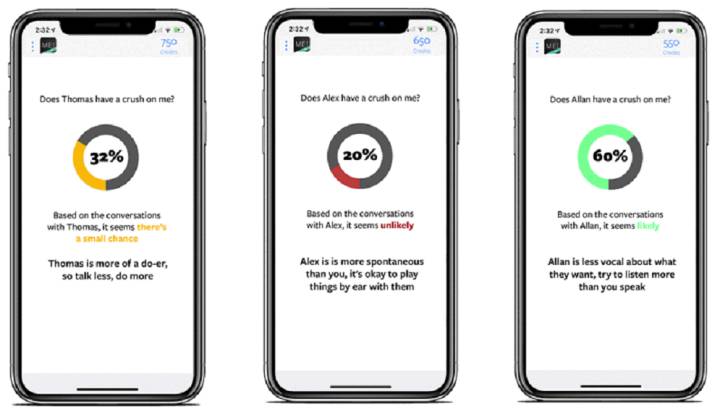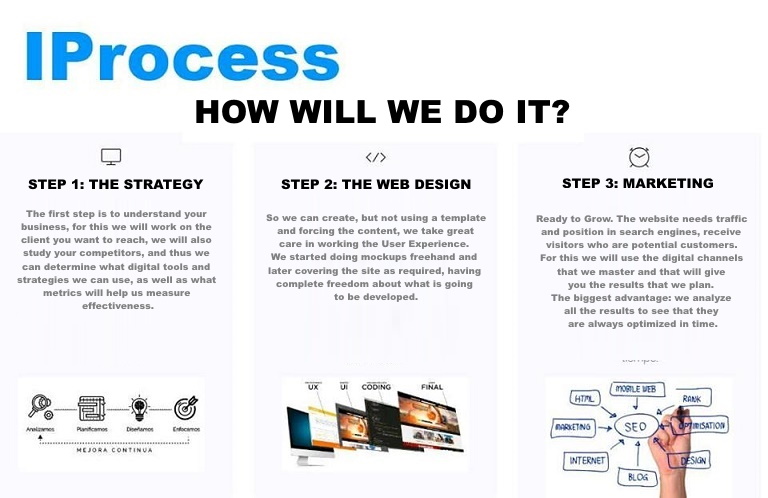WEB IProcess Pyme LITE!
Ideal for small companies that need productive modules, 10 corporate emails, 5 sections, 20 product catalog, 5 SEO campaigns, e-commerce.

 Español
Español
 English
English

Artificial intelligence can help us find a partner. Mei is an application that analyzes the words and expressions of WhatsApp conversations to inform the user if the person they are talking to is hiding a secret, if they are showing abnormal levels of anger or if they are interested in them in an affective way. In the US and Canada it has been on the market since June and more than 600,000 people have downloaded it. In a few weeks Mei will be available in Spain.
"Dating in the future will be largely data-driven," says Es Lee, founder of Mei. The application that streamlines the process of finding a partner will not only tell you if your conversation is on the right track but also, if it detects a certain degree of discomfort in the conversation, it will give you advice on how to bridge the communication gap, that is, how get closer to your interlocutor. “If you see a big difference in a particular trait, like spontaneity, where the user is so low and the contact is so high, it will highlight that trait and give advice on how to change. The goal is to help users recognize if they are different from the people they chat with, so they can try to relate better, ”says Lee.
Mei works with an algorithm that uses neural network models that analyze all the words used in the conversation. "We have models that not only predict whether a relationship is romantic or non-romantic, but they can predict 30 different personality traits of the authors of the texts," says Lee. There are no precise words that the algorithm detects as romantic or not. Although the creators of the app have confirmed that words like sleep and night are highly correlated with romantic relationships. However, if a user deliberately repeats them with or without sense, the algorithm immediately realizes and alerts that something strange is happening.
The main problem with this type of application is that the users who download it the most are the youngest. According to Mei`s website, the user must be at least 13 years old to download it. In Spain the minimum age to accept the use of personal data of application users is 14 years. But during that year, the father, mother or guardian can give consent for the adolescent to use them, as happens with YouTube, Pinterest or Tik Tok. “However, it is easy for a child under 13 to download it simply by saying they are older. Facebook has installed a system for users to verify their age with their ID, but the rest of the applications can be fooled, ”says Sergio Maldonado, CEO of Privacy Cloud.
But the most significant problem is data protection. Mei does not comply with European regulations according to the guidelines in the document on its website. "But it is to be expected that they will adapt it before launching it in Spain with an updated privacy policy and they will probably ask for explicit consents for the company to store user information," says Maldonado. A few months ago there was a wave of concern when the Faceapp application came out. “Nobody reads the conditions and even if they were read, the general public would not understand them. Furthermore, that does not guarantee that the user knows the truth because the privacy policies are very generic, ”adds Maldonado.
"The application also collects all the calls that the user has made, the entire message database and in the future they can use the data of usage information, content information, device information, messages and calendar, the location ”, denounces Eusebio Nieva, Technical Director of Checkpoint in Spain and Portugal. Many applications obtain information from users. The Google search engine provides a series of services in exchange for the user`s information. "But in this case it is getting more information than Google without a tangible benefit for the user," adds Nieva.
Mei could also have disaggregated information. “From conversations and text analysis they can segment information. They obtain data that they can use to, for example, know the tastes of users and then sell them to third parties for advertising purposes ”, concludes Nieva.
Publication Date: 2019-11-08
Source: El país.com:Belén Juárez






Ideal for small companies that need productive modules, 10 corporate emails, 5 sections, 20 product catalog, 5 SEO campaigns, e-commerce.

Ideal to start your presence on the internet, catalog of 5 products, updating documents, hosting, corporate emails and more!

Ideal for small companies that need productive modules, 10 corporate emails, 5 sections, 20 product catalog, 5 SEO campaigns, e-commerce.

Ideal to start your presence on the internet, catalog of 5 products, updating documents, hosting, corporate emails and more!







